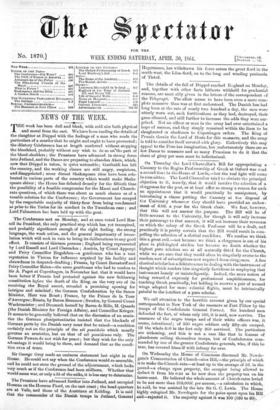On Thursday the Lord Chancellor's Bill for appropriating a Canonry
to the Regius Professorship of Greek at Oxford was read a second time in the House of Lords,—but the real fight will come in committee. The Lord Chancellor triel to obviate-the principal objection to it, namely, that it would involve the selection of a clergyman for the post, or at least offer so strong a reason for such an appointment that it would practically be omnipotent, by introducing a clause putting the Canonry at the disposal of the University whenever they should have provided an endow- ment of 630/. a year for the Greek chair. We fear, however, that this will not answer the purpose. The Bill will be of little account to the University, for though it will only increase their patronage to that amount, it will not increase their revenues on which the salary of the Greek Professor will be a draft, and. practically it is pretty certain that the Bill would result in com- pelling the selection of a clerical candidate. We confess we think this a great evil,—not because we think a clergyman is out of his place in philological stu lies, but because we doubt whether the highest pure scholars are at all naturally fitted for the Church, while we are sure that they would often be singularly averse to the random sort of subscriptions now required from clergymen. A fine classical scholar has a delicate sense in dealing with the instrument of thought which renders him singularly fastidious in employing that instrument loosely or unintelligently. Indeed, the mere notion of being rewarded expressly for professional amphibiousness, for teaching Greek practically, but holding in reserve a pair of unused wings adapted for more celestial flights, must be intrinsically painful to the intellect of a pure scholar.


































